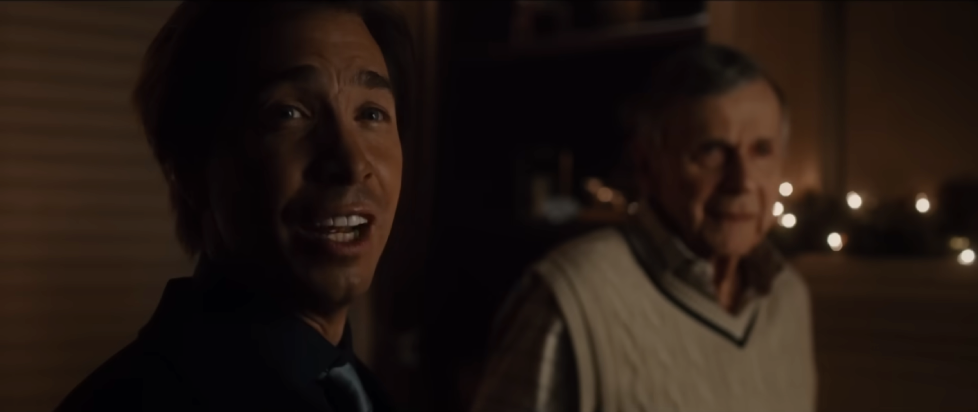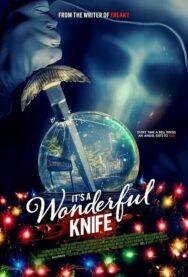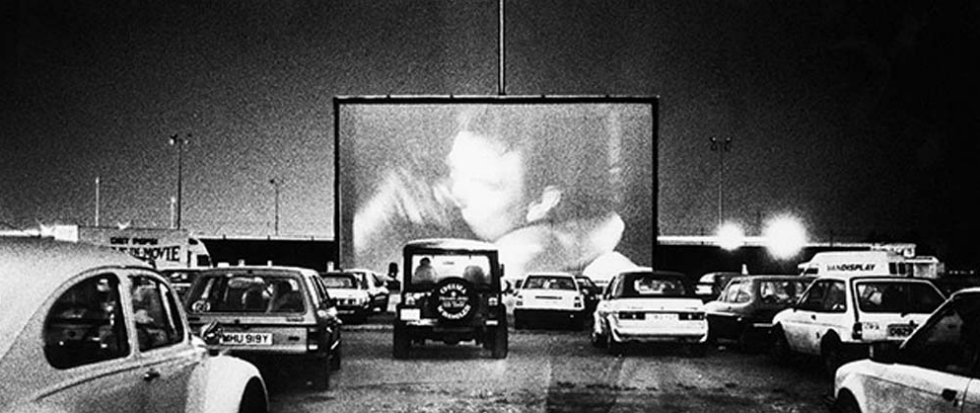
This Town Needs Me: It’s a Wonderful Knife (2023)
“Almost stupid enough to be amazing.”
That’s how I summarized It’s a Wonderful Knife on Letterboxd immediately after viewing it. The latest in a frankly welcome slew of slasher movies reimagining high-concept comedies and (in this case) melodramas that have followed the success of Happy Death Day, it’s probably not hard to guess what Christmas classic It’s a Wonderful Knife is putting its own spin on. And while this one is kind of terrible, it doesn’t make the phenomenon any less amusing. (I’m personally looking forward to when they inevitably give this treatment to Big – 13 Going on Murdered, perhaps?)
The subgenre has yet to produce a genuine classic, but it has mostly been a source of entertaining diversions. Unfortunately, It’s a Wonderful Knife is barely that. There are movies that require you to check your brain at the door, and then there’s whatever this is. Sure, it’s the kind of flick where a character spends one night doing internet research and (correctly) figures out how to undo a wish that was granted by the aurora borealis, but that’s really the least of its weirdness.
This is a film where the plot and performances are more stylized than the shooting and, as a result, is a disjointed, tonal mess. The dystopian Angel Falls where much of the film takes place plays out like a cartoon, which would feel even more jarring if the regular town hadn’t felt like one, too.
Community’s Joel McHale as our protagonist’s father is a good example of both, a character who only feels vaguely like a human being when his will has been broken by the monstrous Henry Waters. The “good” version of McHale’s character is such a bizarre Stepford person that his sinister and shattered alter-ego feels comfortable by comparison.
It doesn’t help that Angel Falls never feels like a place. Despite several aerial establishing shots that show a small, picture-postcard mountain town, and a plot that relies entirely on a real estate-related MacGuffin, we never get a sense of the town itself. It’s impossible to discern where anything is in relation to anything else, and characters just teleport from one set to another. Even the villain’s Delta City-like mixed use retail center is just positioned in the background of one shot near the town’s somewhat inexplicable waterfront.
The villainous Henry Waters, who is both Henry Potter and Ghostface from Scream by way of Moon Knight, is played by Justin Long, the latest in Long’s apparent marathon of appearing as absolute pieces of shit in horror movies. This time around, he’s grinning through an over-the-top dental prosthesis that is pretty much one notch above Baldknobbers novelty dentures, while also serial killing his way to dominance of the confusing burg.

There’s opportunity here for an interesting take on the cult of personality – and especially the kind that can surround the flamboyant masked killers of slasher franchises. It’s a topic that Adam Cesare has explored to phenomenal effect in his Clown in a Cornfield novels, and that has also been touched upon in films like the latest Scream, Trick, and some of the Saw sequels. It’s a Wonderful Knife isn’t interested in that, though, and honestly the entire killer plot feels rushed, which is weird as it is also pretty much the film’s only plot.
All of which is a shame, because there are things to like here. While the stylized performances may not gel, the look of the film is actually pretty good, and director Tyler MacIntyre (Tragedy Girls) and his cinematographer Nicholas Piatnik do some interesting things with lighting. It’s a Wonderful Knife is also casually diverse and queer in a way that would be welcome in a film where the characters felt more human. Besides its central queer romance, there are several other queer characters who are given nice roles and not fridged any more than anyone else is, at least.
Where It’s a Wonderful Knife fails to really thrive, however, is in its plot and script, which feel at all times like they are going through the paces. Even the occasionally bizarre and stilted performances would probably work in a film that felt more narratively sure of itself and interested in following through the implications of its own conceits, rather than simply delivering bland platitudes and reliable “twists” on recognizable formula.
Screenwriter Michael Kennedy was one half of the writing team behind Freaky, which might be the only one of this slew of movies that I still haven’t seen, but it’s often hailed as one of the best that the cottage industry has produced. Can we chalk the difference up to the absence of Kennedy’s Freaky co-scribe Christopher Landon, who also wrote Happy Death Day? Or is it the result of studio interference? Or maybe this was just a misfire?
The reasons don’t really matter. What does is that It’s a Wonderful Knife succeeds, to the extent that it does, almost entirely as an oddity, rather than a film. Fortunately for it, however, even the best of these movies tend to sail along on the strength of their concepts and their poppy tone. And while this may be the least of them, when you’re operating in a field where no one ever tries to fly very high, you never have too awfully far to fall.
———
Orrin Grey is a writer, editor, game designer, and amateur film scholar who loves to write about monsters, movies, and monster movies. He’s the author of several spooky books, including How to See Ghosts & Other Figments. You can find him online at orringrey.com.





